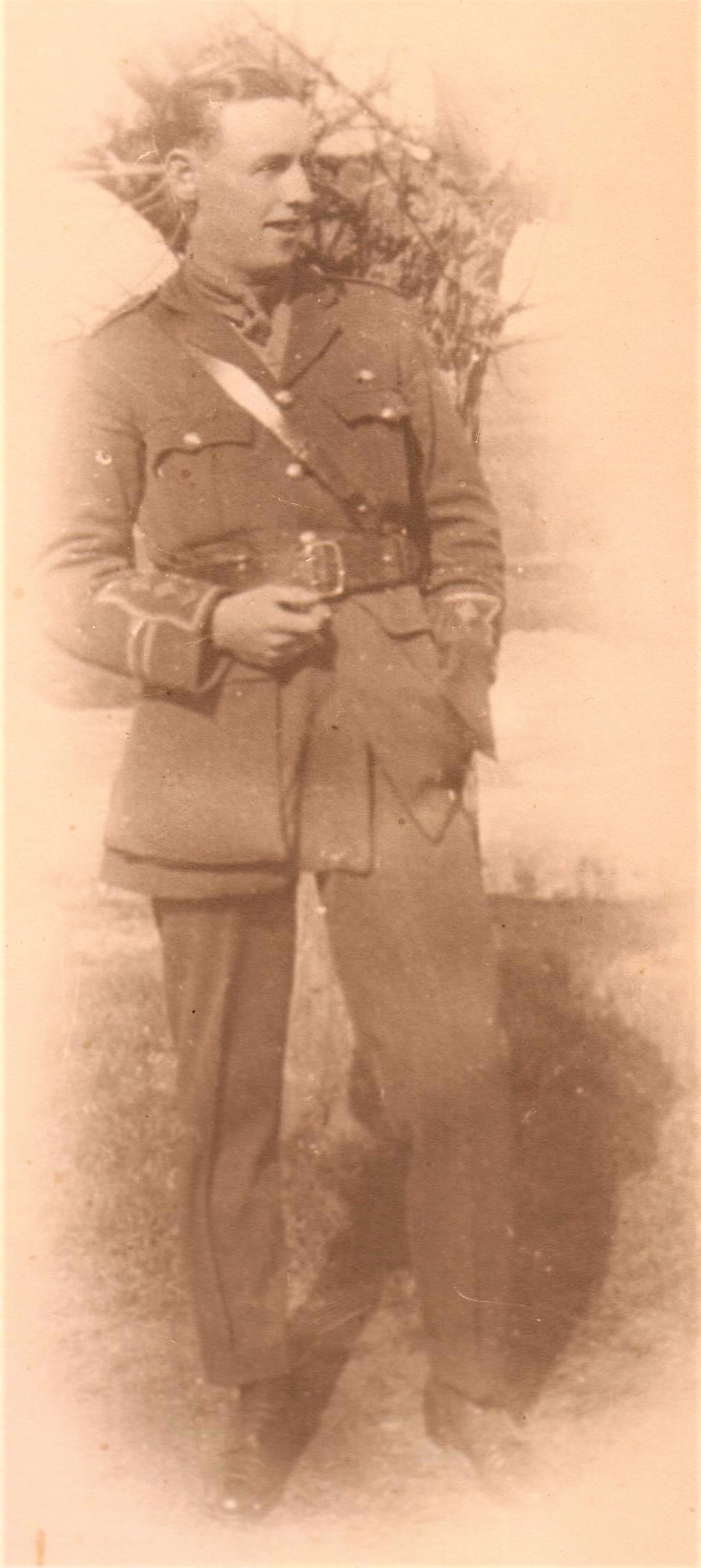
Story submitted by Mrs Drury.
Jack (John Adam) Bell was the son of a gamekeeper at Langdon Beck in Teesdale, County Durham. He grew up in the countryside a became a railway clerk. When he joined the army and went to experience life in the trenches he had the horror of standing next to a fellow soldier when his head was blown off. Jack also had to endure the news that his own brother had been killed.
Jacks country knowledge became most useful in the mire of Flanders. He would cut trenches to make a sleeping place out of the mud, trap rabbits and stew them in a metal helmet. He would look after horses for officers who had never had to look after their own mounts before. He described how starved the horses were near the front line – the near stampedes when fodder was brought and how the horses gnawed each others’ manes and tails for food. He remembered how long the cavalry had to stand mounted and how weak horses collapsed.
Remounts were needed constantly and Jack was sent in to break in and train them. He was stationed on the Thames, possibly at Tilbury, to receive horses, practically wild sent by ship from South America and often in a sorry state on arrival. He had six weeks to prepare each batch (size unknown) for dispatch abroad. During this training Jack rode these recovered and lively horses with a ladies side saddle as he said it was easier to jump off when necessary form a side saddle than from astride!
It was on 26th June 1918 when Jack received his commission as Second Lieutenant. Later, as Captain, he dealt with German Prisoners of War in Italy. He was also involved in the Macedonian Campaign 1915-17 but that is another tale. After the war he attended Magdalen College, Oxford on one of the courses the University put on for officers. He enjoyed rowing on the Isis and soon married Nancy Bainbridge, one of Queen Alexandra’s Imperial Military Nursing Service and they saw their golden wedding anniversary when we had a fine family party.
Explore more memories from the ribbon
-
Richard Oliver
Richard Oliver was 22 years old when he enlisted at Cramlington in September 1914. He was from Esh Winning, Crook, Co. Durham and was a miner. He enlisted in the Northumberland Fusiliers but was posted to the Yorkshire Regiment. He served in the 9th and 10th Battalions and whilst with the 10th Battalion in 1915 he was awarded the Military Medal. He served in France and Italy and became disabled due to the effects of gassing. He was discharged in March 1920 and was initially given a pension of 8 shillings a week, but this was subsequently withdrawn and his appeal rejected. He left the army as a Corporal, he served in France from 1915 to 1917 and on the Italian Front from November 1917 until December 1918.
-
Harold Carey Matthews
Major Harold Carey Matthews was born in 1879, son of F W W Matthews, he went on to join the 4th Battalion Green Howards where he acted as subaltern during the Second Boer War. After retiring from the military he worked for Barclays Bank at Leyburn, where his father also worked. When World War One broke out he re-enlisted with the Green Howards and was promoted to Major, on 29th August 1914. He was killed in action on the 25th April 1915 near Ypres and is buried at Sanctuary Wood Cemetery, Belgium.
-
2nd Lieutenant Arthur F Clarke
2nd Lieutenant Arthur F Clarke was attending the 5th Battalion annual camp in Wales when war broke out. He spent the first months of the war moving between Scarborough, Hull, Newcastle, Hartlepool and Darlington. On the 18th April 1915 he went out to France and was wounded during a gas attack on the 26th May 1915. The Green Howards Gazette records: “The day seemed interminable as the poor shelter had to be hugged tight all the time. With darkness came the order that we were to pass through GHQ lines and take up a front line position in Zouave Wood facing Hooge, where the main attack by the enemy had been made. That little strip of ground has since been the cockpit of our Western front. On our journey up another man was killed, and Lieutenant A F Clarke was wounded. That tour was destined to be the worst we had so far entered upon.” We know he returned to the front line as the Green Howard Gazette for January 1916 records that he was wounded. He rose to the rank of Captain in November 1916.
